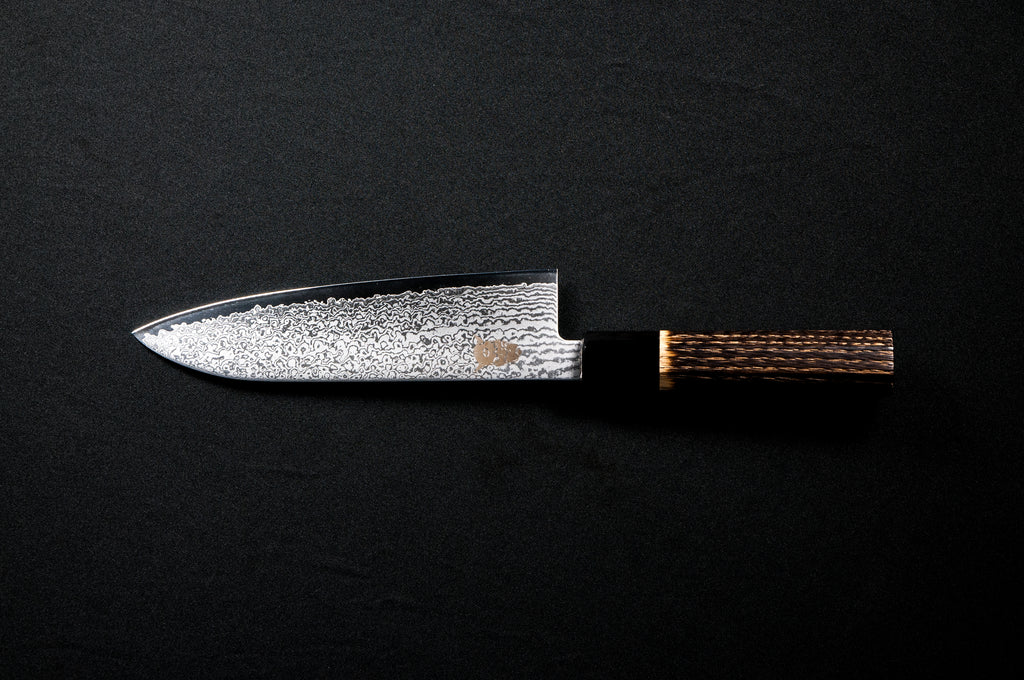
Tsubame-Sanjo is legendary for metalwork. Over 400 years of experience in making tools, from nails, to hammers, to scissors, to outstanding chef knives. YASHA is a joint venture, proudly brought to you by artisans from various little workshops who have been forging blades and crafting wooden handles for centuries. Nothing is ever rushed, everything is made by hand, with no corners cut, no compromises, and every knife is a labour of love.
We thought it would be helpful to have a look at what makes a YASHA knife so special.
the sharpest blades
The most important part of a knife is its sharpness. The sharpness of the knife depends on the quality accuracy of the blade which will glide through your food without you having to apply much pressure.
Damascus steel is a popular material that is extremely sharp and can be mirror polished to enhance its value as a unique Japanese craft.
High-grade stainless blade steel combines the best of both carbon steel and stainless steel. It cuts as well as carbon steel and is resistant to rust like stainless steel. It simply is an ideal steel for knives.

There are quite a few factors at play to make an outstanding blade:
- A hard central part wrapped with softer parts to make the blade hard to bend and break like some Japanese blades do.
- The layers of the steel result in an excellent shape retention (less chipping and dense structure for improved sharpness and longevity)
- Resistance to rust due to its oxidation resistance
- The clear appearance of the layered pattern gives the knife its beautiful finish known as Damascus pattern. The craftsmen of YASHA spend almost double the time other knife-makers do to give the Damascus pattern so much character and clarity!

If only VG10 steel is used, it becomes difficult to forge a really sharp knife due to the lack of flexibility and because the steal is quite stubborn when it comes to the heat treatment. However, by layering multiple steels over the VG10, YASHA were able to create a material with composite properties that is flexible and a pleasure to sharpen.
the "tusba" muzzle
The Japanese word for the muzzle part is "Tsuba" and is made of buffalo horns and has a luxurious feel. The horns of the water buffalo shrink with age and will keep the blade in place!
A lot of makers has shifted to plastic muzzles in recent years which is a lot cheaper and quite durable, but many cooks choose the buffalo horn for its stability and reliability, and it is recognized as a signifier of a high quality knife. It's natural sheen and luxurious feel can simply not be replicated by other materials.

the wooden handle
The handles are made from Japanese zelkova and chestnut wood. In order to maintain the strength of the handle, only the very center of the wood is used – the strongest and most durable part. In addition, skilled artisans manually craft the octagonal shape one by one to create a handle that is easy to hold and has smooth feeling of form. The longer you use it, the more comfortable it will be for you to use. Wood, as a natural material, will adapt to your grip over time.


Japanese zelkova has been used for building since ancient times as a high-grade wood in Japan. It has not only strength as a wood, but also the strong grain and luster create. The lighter wood will also develop a lovely patine over time.

Made in Tsubame-Sanjo/Japan
All processes are done by the craftsmen of Tsubame-Sanjo. Every single item is made in Japan, with Japanese materials, and made by Japanese artisans who take great pride in their region and their rich history. Tsubame-Sanjo has been the epicentre of Japan's blacksmiths for over 400 years now, and they still carry on the traditional techniques and ideas and YASHA is quintessentially a manifestation of all the local talent and experience. When you own a knife from YASHA, you own a part of Tsubame-Sanjo and you will never want to use another knife again.

